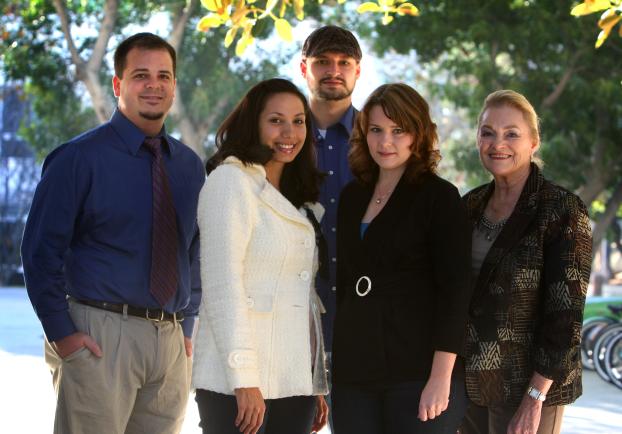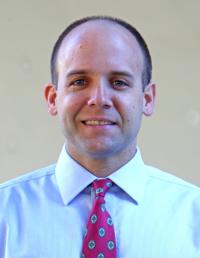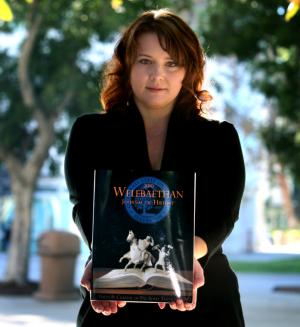 Caption: From left: Abraham J. Johnson, Christina Lopez, David K. Kloster, Nickoal L. Eichmann and Welebaethan adviser Wendy Elliott-Scheinberg. Photo by Karen TapiaDownload Photo
Caption: From left: Abraham J. Johnson, Christina Lopez, David K. Kloster, Nickoal L. Eichmann and Welebaethan adviser Wendy Elliott-Scheinberg. Photo by Karen TapiaDownload Photo
Two Dozen Wins
Student History Journal Awarded Best in Nation Again
For the 24th year in a row, Cal State Fullerton’s student history journal, Welebaethan, has been named the best in the nation by the National History Honor Society, Phi Alpha Theta.
“We don’t produce the Welebaethan to win,” said Nickoal L. Eichmann, a history graduate student and the journal’s editor. “We do it because we love and appreciate history as a tool to better understand the ever evolving human condition.”
Still, when she received the award letter, Eichmann, the journal’s advisers, student writers and copy editors let out a collective sigh of relief.
“There’s always a healthy pressure that comes along with each production,” said Eichmann, who served as secretary of the campus history student honor society, Theta-Pi, that this year won best chapter award for the 30th year in a row from Phi Alpha Theta. “Each year, the pressure increases tenfold.”
Featured in the latest award-winning Welebaethan are 18 papers, two oral histories (one on orphans, the other on Fullerton’s religious institutions), three book reviews (paint culture in early modern Europe, pain in early modern European culture and Gustavo Arellano’s “Orange County”) and a film review of “Braveheart.”
Among the 18 papers are the following award winners:
• “Knights of the Sea: The Naval Pursuits of the Hospitallers and Templars” by David K. Kloster. The article, about the crusading knights in the Mediterranean in the late 13th century, won the university’s Lawrence B. de Graaf Prize for Best Overall Paper.
 Caption: Peter R. Roberts won the Ric Miller Prize for Best European History award for his analysis of the context and content of three dozen 16th-century sermons and documents. The paper was included in the latest issue of the Welebaethan. Photo by Karen TapiaDownload Photo
Caption: Peter R. Roberts won the Ric Miller Prize for Best European History award for his analysis of the context and content of three dozen 16th-century sermons and documents. The paper was included in the latest issue of the Welebaethan. Photo by Karen TapiaDownload Photo
• “Violence as the Voice of the People: Early Reformation Iconoclasm as Negotiation” by Peter R. Roberts. Winner of the Ric Miller Prize for Best European History, it is an analysis of the context and content of three dozen 16th-century sermons and documents.
• “Picking, Packing and Prevailing: A Community Study of the Cypress Street Barrio, 1900-1950” by Bryon Walsh. The paper about Mexican immigrants who fled poverty, violence and insecurity to live and work in Southern California’s citrus fields is winner of the William Langsdorf Prize for Best Western/Local History.
• “Battle on the Ice (1242): Historical Legacy of an Underappreciated Conflict” by Abraham J. Johnson. Winner of the Best of New Approaches to History award, the paper exposes readers to an aspect of historical thinking: the implication of mythopoetic discourse in determining the battle’s significance and the role of historians.
• “A New Nationalism: Women Writers on the Lebanese Civil War” by Johanna L. Peterson. Winner of the Best Women’s History award, the article discusses the scholarship of historian Miriam Cooke and other female writers of war.
• “The Russian Revolution: An investigation Into Perspective” by Sam H. Muhadly. Winner of the Best Intellectual History, the paper delves into the scope and impact of the Russian Revolution.
• Winning the Best Oral History Award was Christina Lopez’ “Orphan Children: Life Through Their Eyes — Interviews with Beatrice Noel and Seymour Scheinberg.”
“This particular journal contains a variety of both undergrad and grad student papers representing most fields of history,” said Wendy Elliott-Scheinberg, history lecturer and Welebaethan adviser. “Many students worked many, extra hours — well beyond those expected of them — to manage to meet all the deadlines, including the national competition for Best Chapter and Best Journal.”
Jochen Burgtorf, professor of history and Theta-Pi’s adviser, agreed.
“In my opinion, this is the most meticulously edited volume to date in the Welebaethan’s prestigious history,” he said. “Its layout, especially its cover image, with knights leaping forth from a book, is very appealing and the cross section of articles and essays reflects the range and high quality of our students’ research. It should also be noted that, thanks to the hard work of the 2010 editor, Ms. Eichmann, the journal was completed considerably ahead of schedule, which is a great accomplishment for anyone working in publishing.”
Most of the journal’s writers and editors also are members of the honor society. Joining Eichmann on the 2009-10 board of Theta-Pi were graduate students Abraham J. Johnson, president; David K. Kloster, vice president; Eichmann, secretary; and history major Babbette Tyler, treasurer.
This academic year’s Welebaethan and Theta-Pi will be judged in competition with colleges and universities nationwide next year.
The students credit their advisers — history faculty members Elliott-Scheinberg, Burgtorf and Gordon M. Bakken — for their support and mentorship.
“They truly care about students and the Welebaethan as a vehicle toward advancement in the historical field,” Eichmann said. “All of our professors exhibit unique qualities that distinguish them from other universities. They are especially devoted to history, their students and their roles as educators. How else could we remain unbeatable?”
Dec. 21, 2010
 Nickoal L. Eichmann holds the award-winning 2010 Welebaethan. Photo by Karen Tapia
Nickoal L. Eichmann holds the award-winning 2010 Welebaethan. Photo by Karen Tapia 